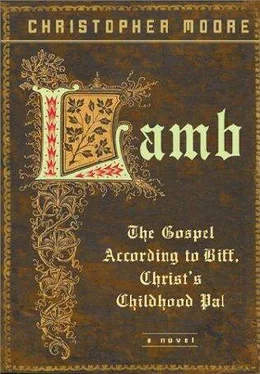“After that,” Maggie said, “Jakan didn’t come near me. There was bleeding right after the baby died, and as far as he knew it never stopped. He’s always been afraid that someone might think that there’s a curse on his house, so my duties as a wife were public only. It’s a double-edged sword for him. In order to appear dutiful I had to go to the synagogue and to the women’s court in the Temple, but if they thought I was going there while I was bleeding I would have been driven out, maybe stoned, and Jakan would have been shamed. Who knows what he’ll do now.”
“He’ll divorce you,” I said. “He’ll have to if he wants to save face with the Pharisees and the Sanhedrin.”
Strangely enough, it was Joshua who I had trouble consoling about Maggie’s lost child. She’d lived with the loss for years, cried over it, allowed it to heal as much as it would, but the wound was fresh for Joshua. He walked far behind us, shunning the new disciples who pranced around him like excited puppies. I could tell that he was talking to his father, and it didn’t seem to be going well.
“Go talk to him,” Maggie said. “It wasn’t his fault. It was God’s will.”
“That’s why he feels responsible,” I said. We hadn’t explained to Maggie about the Holy Ghost, the kingdom, all the changes that Joshua wanted to bring to mankind, and how those were at odds, at times, with the Torah.
“Go talk to him,” she said.
I fell back in our column, past Philip and Thaddaeus, who were trying to explain to Nathaniel that it was his own voice he heard when he put his fingers in his ears and spoke, and not the voice of God, and past Thomas, who was having an animated discussion with empty air.
I walked along beside Joshua for a while before I spoke, and then I tried to sound matter-of-fact. “You had to go to the East, Joshua. You know that now.”
“I didn’t have to go right then. That was cowardly. Would it have been so bad to watch her marry Jakan? To see her child born?”
“Yes, it would have. You can’t save everyone.”
“Have you been asleep these last twenty years?”
“Have you? Unless you can change the past, you’re wasting the present on this guilt. If you don’t use what you learned in the East then maybe we shouldn’t have gone. Maybe leaving Israel was cowardly.”
I felt my face go numb as if the blood had drained from it. Had I said that? So, we walked along for a while in silence, not looking at each other. I counted birds, listened to the murmur of the disciples’ voices ahead, watched Maggie’s ass move under her dress as she walked, not really enjoying the elegance of it.
“Well, I, for one, feel better,” said Joshua finally. “Thanks for cheering me up.”
“Glad to help,” I said.
We arrived in Capernaum on the morning of the fifth day after leaving Bethany. Peter and the others had been preaching the good news to the people on the shore of Galilee and there was a crowd of perhaps five hundred people waiting for us. The tension had passed between Joshua and me and the rest of the journey had been pleasant, if for no other reason than we got to hear Maggie laugh and tease us. My jealousy of Joshua returned, but somehow it wasn’t bitter. It was more like familiar grief for a distant loss, not the sword-in-the-heart, rending-of-flesh agony of a heartbreak. I could actually leave the two of them alone and talk to other people—think of other things. Maggie loved Joshua, that was assured, but she loved me as well, and there was no way to divine how that might manifest. By following Joshua we had already divorced ourselves of the expectations of normal existence. Marriage, home, family: they were not part of the life we had chosen, Joshua made that clear to all of his disciples. Yes, some of them were married, and some even preached with their wives at their sides, but what set them apart from the multitudes who would follow Joshua was that they had stepped off the path of their own lives to spread the Word. It was to the Word that I lost Maggie, not to Joshua.
As exhausted as he was, as hungry, Joshua preached to them. They had been waiting for us and he wouldn’t disappoint them. He climbed into one of Peter’s boats, rowed out from the shore far enough for the crowd to be able to see him, and he preached to them about the kingdom for two hours.
When he had finished, and had sent the crowd on their way, two newcomers waited among the disciples. They were both compact, strong-looking men in their mid-twenties. One was clean-shaven and wore his hair cut short, so that it formed a helmet of ringlets on his head; the other had long hair with his beard plaited and curled in the style I had seen on some Greeks. Although they wore no jewelry, and their clothes were no more fancy than my own, there was an air of wealth about them both. I thought it might have been power, but if it was, it wasn’t the self-conscious power of the Pharisees. If nothing else, they were self-assured.
The one with the long hair approached Joshua and kneeled before him. “Rabbi, we’ve heard you speak of the coming of the kingdom and we want to join you. We want to help spread the Word.”
Joshua looked at the man for a long time, smiling to himself, before he spoke. He took the man by the shoulders and lifted him. “Stand up. You are welcome, friends.”
The stranger seemed baffled. He looked back at his friend, then at me, as if I had some answer to his confusion. “This is Simon,” he said, nodding toward his friend. “My name is Judas Iscariot.”
“I know who you are,” Joshua said. “I’ve been waiting for you.”
And so we became fifteen: Joshua, Maggie, and me; Bartholomew, the Cynic; Peter and Andrew, John and James, the fishermen; Matthew, the tax collector; Nathaniel of Cana, the young nitwit; Philip and Thaddeus, who had been followers of John the Baptist; Thomas the twin, who was a loony; and the Zealots, Simon the Canaanite and Judas Iscariot. Fifteen went out into Galilee to preach the Holy Ghost, the coming of the kingdom, and the good news that the Son of God had arrived.
Joshua’s ministry was three years of preaching, sometimes three times a day, and although there were some high and low points, I could never remember the sermons word for word, but here’s the gist of almost every sermon I ever heard Joshua give.
You should be nice to people, even creeps.
And if you:
a) believed that Joshua was the Son of God (and)
b) he had come to save you from sin (and)
c) acknowledged the Holy Spirit within you (became as a little child, he would say)(and)
d) didn’t blaspheme the Holy Ghost (see c),
then you would:
e) live forever
f) someplace nice
g) probably heaven.
However, if you:
h) sinned (and/or)
i) were a hypocrite (and/or)
j) valued things over people (and)
k) didn’t do a, b, c, and d,
then you were:
l) fucked
Which is the message that Joshua’s father had given him so many years ago, and which seemed, at the time, succinct to the point of rudeness, but made more sense after you listened to a few hundred sermons.
That’s what he taught, that’s what we learned, that’s what we passed on to the people in the towns of Galilee. Not everybody was good at it, however, and some seemed to miss the point altogether. One day Joshua, Maggie, and I returned from preaching in Cana to find Bartholomew sitting by the synagogue at Capernaum, preaching the Gospel to a semicircle of dogs that sat around him. The dogs seemed spellbound, but then, Bart was wearing a flank steak as a hat, so I’m not sure it was his speaking skills that held their attention.
Joshua snatched the steak off of Bartholomew’s head and tossed it into the street, where a dozen dogs suddenly found their faith. “Bart, Bart, Bart,” Josh said as he shook the big man by the shoulders, “don’t give what’s holy to dogs. Don’t cast your pearls before swine. You’re wasting the Word.”
Читать дальше










